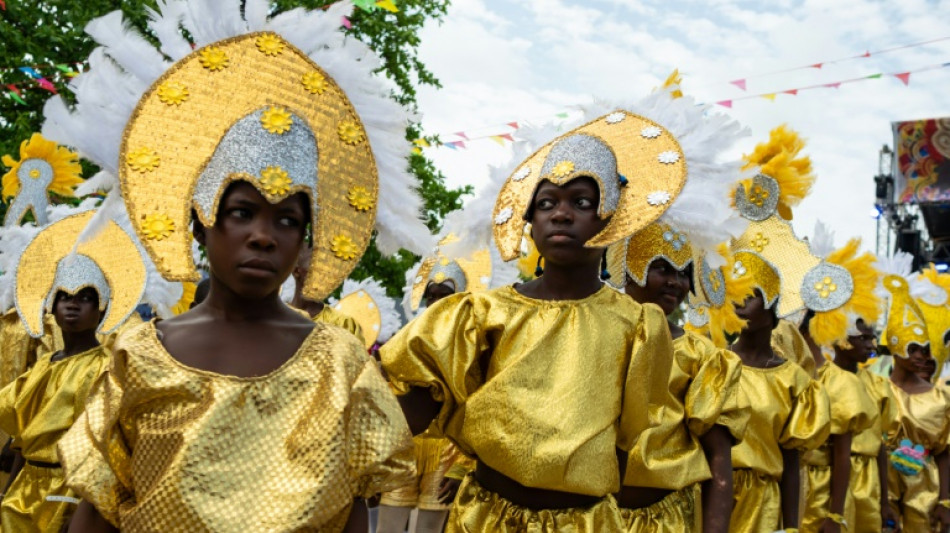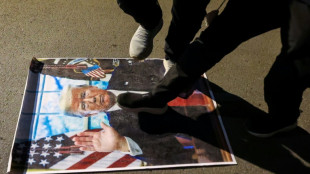
-
 Morocco part company with coach Regragui as World Cup looms
Morocco part company with coach Regragui as World Cup looms
-
Lens beat Lyon on penalties to reach French Cup semis

-
 El Salvador's Bukele holding dozens of political prisoners: rights group
El Salvador's Bukele holding dozens of political prisoners: rights group
-
With Iran war, US goes it alone like never before

-
 Spurs slip deeper into relegation trouble after loss to Palace
Spurs slip deeper into relegation trouble after loss to Palace
-
European, US stocks back in sell-off mode as oil prices surge

-
 Pete Hegseth: Trump's Iran war attack dog
Pete Hegseth: Trump's Iran war attack dog
-
Celtics' Tatum could make injury return on Friday

-
 'Enemy at home': Iranian authorities tighten grip as war rages
'Enemy at home': Iranian authorities tighten grip as war rages
-
Bethell set for 'hell of a career', says England captain Brook

-
 France coach Galthie slams Scotland for 'smallest changing room in the world'
France coach Galthie slams Scotland for 'smallest changing room in the world'
-
Medvedev arrives in Indian Wells after being stranded in Dubai

-
 Trump fires homeland security chief Kristi Noem
Trump fires homeland security chief Kristi Noem
-
Mideast war risks pulling more in as conflict boils over

-
 Wales' James Botham 'sledged' by grandfather Ian Botham after Six Nations error
Wales' James Botham 'sledged' by grandfather Ian Botham after Six Nations error
-
India hero Samson eyes 'one more' big knock in T20 World Cup final

-
 Britney Spears detained on suspicion of driving while intoxicated
Britney Spears detained on suspicion of driving while intoxicated
-
Grooming makes Crufts debut as UK dog show widens offer

-
 Townsend insists Scots' focus solely on France not Six Nations title race
Townsend insists Scots' focus solely on France not Six Nations title race
-
UK sends more fighter jets to Gulf: PM

-
 EU to ban plant-based 'bacon' but veggie 'burgers' survive chop
EU to ban plant-based 'bacon' but veggie 'burgers' survive chop
-
Leagues Cup to hold matches in Mexico for first time

-
 India reach T20 World Cup final after England fail in epic chase
India reach T20 World Cup final after England fail in epic chase
-
Conservative Anglicans press opposition to Church's first woman leader

-
 Iran players sing anthem and salute at Women's Asian Cup
Iran players sing anthem and salute at Women's Asian Cup
-
India beat England in high-scoring T20 World Cup semi-final

-
 Mideast war traps 20,000 seafarers, 15,000 cruise passengers in Gulf
Mideast war traps 20,000 seafarers, 15,000 cruise passengers in Gulf
-
Italy bring back Brex to face England

-
 French policeman to be tried over 2023 killing of teen
French policeman to be tried over 2023 killing of teen
-
Oil prices rise, stocks slide as Middle East war stirs supply concerns

-
 More flights take off despite continued fighting in Middle East
More flights take off despite continued fighting in Middle East
-
Ukraine, Russia free 200 POWs each

-
 Middle East war halts work at WHO's Dubai emergency hub
Middle East war halts work at WHO's Dubai emergency hub
-
Paramount's Ellison vows CNN editorial independence

-
 US says attacks on alleged drug boats have spooked traffickers
US says attacks on alleged drug boats have spooked traffickers
-
Dempsey returns as Scotland shuffle pack for Six Nations clash against France

-
 India pile up 253-7 against England in T20 World Cup semi-final
India pile up 253-7 against England in T20 World Cup semi-final
-
Wary Europeans pledge 'defensive' military aid in Mideast war

-
 Seven countries to boycott Paralympics ceremony over Russia: organisers
Seven countries to boycott Paralympics ceremony over Russia: organisers
-
UK's Crufts dog show opens with growing global appeal

-
 PSG prepare for Chelsea clash with Monaco rematch
PSG prepare for Chelsea clash with Monaco rematch
-
Google opens AI centre as Berlin defends US tech reliance

-
 Second Iranian ship nears Sri Lanka after submarine attack
Second Iranian ship nears Sri Lanka after submarine attack
-
Portugal mourns acclaimed writer Antonio Lobo Antunes

-
 Union loses fight against Tesla at German factory
Union loses fight against Tesla at German factory
-
Wales revel in being the underdogs, says skipper Lake

-
 German school students rally against army recruitment drive
German school students rally against army recruitment drive
-
Wary European states pledge military aid for Cyprus, Gulf

-
 Liverpool injuries frustrating Slot in tough season
Liverpool injuries frustrating Slot in tough season
-
Real Madrid will 'keep fighting' in title race, vows Arbeloa


Afro-Brazilian carnival celebrates cultural kinship in Lagos
Thousands of young and old descendants of formerly enslaved people donned elaborate costumes Sunday to bring the rhythm, vibrancy and colours of Brazil's Rio Carnival to the streets of Lagos in Nigeria.
The festival, albeit on a smaller scale than that of its Brazilian model, helps to keep their heritage alive and celebrate the city's Afro-Brazilian history.
After Brazil abolished slavery, some of those who had been enslaved returned to west Africa, settling in several countries including Nigeria and Sierra Leone.
They brought with them Latin American culture -- dance, food, religion and colours -- that lives on today in pockets of the megacity of Lagos.
At Sunday's Fanti Carnival, a stilt-walking woman in a green-and-yellow dress with a yellow fascinator on her head danced rhythmically to sounds of loud drums and trumpets, sometimes stealing a hug from a man also performing on stilts.
Just behind them, a group of young men in striking face masks were preparing for a "dragon dance" using long rubber dragons similar to those that feature in Chinese New Year celebrations.
"We want to keep (our heritage) alive, very colourful... we love colours," said retired fine art teacher Onabolu Abiola, 67, dressed in the green and yellow of the Brazilian flag.
"During this period, we don't bother ourselves with the economic situation or whatever... everybody comes together to have fun," said he added, breaking into an impromptu dance to traditional Nigerian Yoruba music.
- 'Story of hope' -
"We are here to show culture, we are here to make history -- the celebration of culture is important," said 50-year-old Mayegun Musiliu as he walked with fellow performers. "This is how we sustain it."
Brazil was the last place in the Americas to abolish slavery when it formally ended the practice in 1888.
Many slaves were forced to adopt Portuguese names, and today in Nigeria, it is common to find people with Yoruba first names and Portuguese surnames.
One of them is Aduke Gomez, a 62-year-old lawyer and historian.
"The story of Afro-Brazilians is a story of tragedy... but it's a story of hope, it's a story of resilience," she said. Loud music blaring from speakers almost drowned out her words.
"Personally, I'm very proud to be an Afro-Brazilian descendent because when you think of the chances of how many people came back and when they came back -- they came back with nothing... and many of them worked and lived to become educated and were contributing positively."
The carnival, she added, "is not just a day, it's a tangible legacy of what my ancestors went through".
- A little-known legacy -
Another participant, renowned filmmaker and actress Joke Silva, 64, recalled how her parents always used to bring her to the Fanti festival as a child.
She said she now continued the tradition, bringing her children to the celebrations.
"There needs to be more interrogation on how the trauma of (slavery)... has been part of what we are today. But that is not to claim victimhood," she said.
The carnival represents a part of Nigeria's history that is not always well known -- though some are trying to change that.
Kelenchi Anabaraonye, 27, curated a history exhibition at the festival.
"I had friends who were named Pionero, Pereira, Da Silva, Gomez," said Anabaraonye.
"Back then I thought they were jesting with the names, because you have a Yoruba first name and why are your surnames foreign? I didn't know that there was some historical connection."
I.Stoeckli--VB



